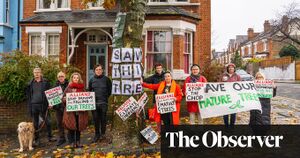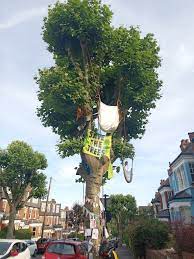Document:High-stakes fight for one tree comes to an autumnal crunch
| "If insurers are allowed to succeed here it will threaten many thousands of trees across the country", says barrister Paul Powlesland. "The fact is we all have a stake in Haringey's Oakfield plane – as long as it still stands." |
Subjects: Haringey Tree Protectors, Haringey Council, Aviva, Allianz, Innovation Group, Marcus Decker, Just Stop Oil, Paul Powlesland
Source: The Observer (Link)
★ Start a Discussion about this document
High-stakes fight for one tree comes to an autumnal crunch
On a warm midsummer evening in 2022, I stood under a plane tree on the corner of a north London red-brick street and chatted with Marcus Decker, who was then preparing for his 50th night sleeping in a hammock high among the tree's branches. The pair of them, he said, tree and Marcus, were becoming old friends – as well as allies in a struggle.
The tree, on the bucolically named Oakfield Road in Stroud Green, was on the frontline of a battle being waged in the capital, a triangular fight between multinational insurance companies, councils and some of London's oldest residents – its 100,000 plane trees, originally planted to help the smoggy city breathe, because of the natural ability of their bark to absorb pollution and shed it in silvery layers.
Oakfield Road was a test case in this fight. The insurers Aviva, whose policies covered numbers 61 and 63 of the street's Victorian terrace, were insisting – with highly contested evidence – that damage to the foundations of those houses was being caused by the tree. If the 123-year-old tree – planted into the London clay at the same time the houses were built – was not chopped down, the insurers claimed, then the council and not they would be liable for the potential cost of underpinning the houses (and attendant legal fees to prove the point).
A group of local residents, seeing that all the plane trees in their area might be subject to similar threats, banded together to challenge that order. Trained in climbing skills by Marcus Decker, and aged between 18 and 72, they vowed to protect the tree day and night from council chainsaws.
A time-lapse film of the "Oakfield plane" in the 18 months since then would make a dramatic film. The protesters' vigil continued, though by the autumn Decker had been arrested for another climbing feat – as part of a Just Stop Oil protest on the suspension bridge at the Dartford Crossing (Decker was later imprisoned for a draconian two years and seven months).[1] In the spring, Haringey Council executed a "dawn raid" on the Oakfield plane, encasing the tree in scaffolding and white tarpaulin, as if it was the scene of a murder. A private security firm complete with floodlit surveillance platform and portable toilet was hired to "protect" the tree 24/7 until it could be felled.
Since then, most of the action has taken place in courtrooms. The Oakfield Road protesters were first presented with a restraining order preventing further action; the the tree was saved from destruction by a last-minute injunction. The hope was that the stay would persist until the publication of a binding report from the Financial Ombudsman Service (due in December). In the meantime, however, the insurers have continued to remind the council of its eye-watering potential liability. A month ago, residents received a letter giving notice of Haringey's continued intent to remove the tree. That period of notice concludes on Wednesday at midnight: five days before another court hearing.
This weekend a new vigil, led by the Haringey Tree Protectors will return to the tree. The leader of the group, Giovanna Iozzi, a writer and academic, told me on Friday that the persistence of the insurers' legal campaign was evidence of their determination to set a precedent for subsidence cases. She points to the contradiction between councils removing trees from urban settings, while emphasising their environmental commitment:
"We had this amazing natural cooling system on our streets, these incredible Victorian green giants, and one by one cities are being denuded of them."
The vigil, she said, would be in solidarity with Decker, who remains in prison.
(When I spoke to his partner Holly Cullen-Davies, she was on her way back from visiting him. "He has started a prison choir and he's working in the garden and learning more and more about horticulture.")
Decker is eligible for release next February, when he faces a deportation order to his native Germany, where he has not lived for many years.
The barrister Paul Powlesland, who has acted for the residents, insists that "if insurers are allowed to succeed here then it will very likely threaten many hundreds and thousands of trees across the country." In April, a comparable effort to save a London plane tree in Lewisham failed despite a campaign involving nearly 50,000 supporters; another legal battle, in Cambridge, saved three ancient plane trees from the axe earlier this month.[2] Powlesland says:
"We may have a situation where the Ombudsman finds in the householders' favour, but the tree has already gone."
A statement from Allianz on the case says: "it would not be appropriate for us to comment due to the ongoing process", but that "ultimately this claim has always been about the solidity of two homes and we have always viewed removing the trees as a last resort."
Haringey Council outlined the high-stakes dilemma faced by local authorities up and down the country: "If the tree remains, the council is facing an insurance claim of up to £1m in relation to just one of the properties...which would be better spent on delivering key frontline services. It is wrong that councils are having to make the choice between saving a tree and paying huge sums of taxpayers' money, or felling a tree."
The protesters say the council misunderstands its responsibility.
- As a district judge in one of the court cases said:
- "The local authority are guardians of the tree. The council may own it, but it doesn't just belong to them."
- That idea, Paul Powlesland says, is "what we need to aim for". The fact is, he says, we all have a stake in the Oakfield plane – as long as it still stands.

